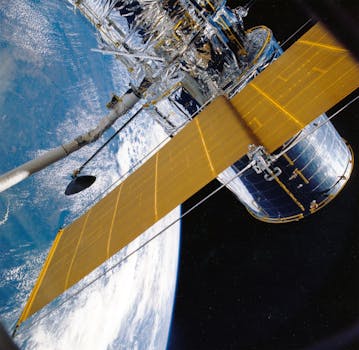
The Future of Satellites: Revolutionizing Global Communication and Exploration. The future of satellites holds immense promise, with advancements in technology and innovation set to revolutionize global communication, space exploration, and more. Satellites have been a crucial part of modern life for decades, providing everything from television broadcasts to GPS navigation. However, the next generation of satellites is set to take this to a whole new level, with faster, more efficient, and more powerful technology.
One of the most significant developments in the future of satellites is the rise of small satellites, also known as cube satellites or nano satellites. These tiny satellites, often no larger than a shoebox, are designed to be smaller, cheaper, and more agile than traditional satellites. They are launched into space in large numbers, creating a network of satellites that can provide global coverage and real-time data. This technology has the potential to revolutionize industries such as agriculture, disaster response, and environmental monitoring, where timely and accurate data is crucial.
Advancements in Satellite Technology
Advancements in satellite technology are also driving the development of more efficient and sustainable satellites. New materials and designs are being used to create satellites that are lighter, more fuel-efficient, and have longer lifespans. This reduces the cost and environmental impact of launching and operating satellites, making them more accessible to a wider range of organizations and countries. Additionally, the use of solar power and other renewable energy sources is becoming more prevalent, reducing the reliance on traditional fossil fuels and minimizing the risk of pollution.
Another significant advancement in satellite technology is the development of satellite constellations. These are networks of satellites that work together to provide global coverage and real-time data. constellations such as OneWeb and Starlink are set to provide high-speed internet connectivity to even the most remote and underserved communities, bridging the digital divide and providing new opportunities for economic growth and development.
Exploration and Research
Satellites are also playing a crucial role in space exploration and research. From studying the Earth’s climate and weather patterns to exploring the surface of Mars and beyond, satellites are providing scientists with a wealth of new data and insights. The use of satellites in astrobiology, the study of the origin, evolution, distribution, and future of life in the universe, is also becoming more prevalent. Satellites such as the Kepler space telescope have discovered thousands of exoplanets, revolutionizing our understanding of the universe and the potential for life beyond Earth.
The future of satellites in exploration and research is exciting and varied, with new missions and projects being planned and launched all the time. From the European Space Agency’s Gaia mission, which is creating a highly accurate 3D map of the Milky Way galaxy, to NASA’s Artemis program, which aims to return humans to the lunar surface by 2024, satellites are set to play a crucial role in advancing our understanding of the universe and pushing the boundaries of human knowledge and achievement.
Challenges and Opportunities
Despite the many benefits and opportunities presented by the future of satellites, there are also challenges and risks that need to be addressed. The growing number of satellites in orbit around the Earth is creating concerns about space debris and the potential for collisions. The use of satellites in military and defense applications is also raising questions about the ethics and legality of satellite-based warfare. Additionally, the increasing reliance on satellites for critical infrastructure and services is creating new vulnerabilities and risks, such as the potential for cyber attacks and data breaches.
However, these challenges also present opportunities for innovation and growth. The development of new technologies and strategies for managing space debris and preventing collisions is driving advancements in areas such as robotics and artificial intelligence. The use of satellites in sustainable and environmentally-friendly ways is also becoming more prevalent, with the development of green propulsion systems and other eco-friendly technologies. As the future of satellites continues to evolve and unfold, it is likely that we will see new and innovative solutions to these challenges, as well as new opportunities for growth and development.
Conclusion
In conclusion, the future of satellites is set to be shaped by a combination of technological advancements, innovation, and investment. As the world becomes increasingly dependent on satellites for communication, navigation, and exploration, the demand for faster, more efficient, and more powerful technology will continue to drive growth and development in the industry. While there are challenges and risks associated with the future of satellites, these also present opportunities for innovation and growth, and it is likely that we will see new and exciting developments in the years to come.




